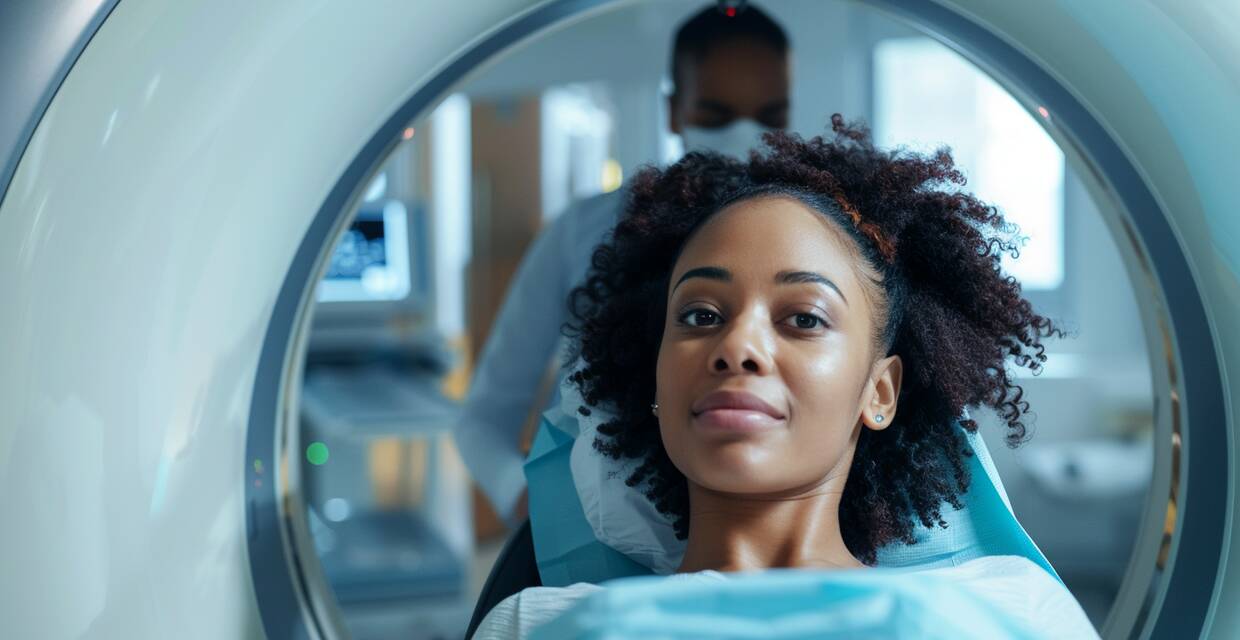Key Points
- MRIs are highly effective medical imaging tests that use radio waves and magnets to provide detailed images of internal organs, bones, and tissues.
- This imaging method is safer and more sustainable than X-rays, ultrasounds, and CT scans as it doesn't use ionizing radiation.
- MRIs can help diagnose a range of conditions including brain disorders, heart damage, tumors, and structural problems of the aorta.
- Preparation for an MRI involves sharing any claustrophobia or health history with your doctor, and leaving jewelry at home.
- During the procedure, patients should expect noise, lying still for a period, and possibly receiving contrast dye, with normal activities typically resumable afterwards.
MRIs (magnetic resonance imaging) are among the most popular and effective medical imaging tests, according to Health Images. MRI scans provide detailed images of your internal organs and are used to diagnose many abnormalities and monitor treatments.
Like many laboratory and imaging tests, finding out you need an MRI can be nerve-wracking. One thing that could help you calm your nerves is understanding what an MRI is, how it works, how to prepare for it, and what to expect when you’re getting it done.
What Is an MRI?
“MRI” stands for magnetic resonance imaging—an imaging test that uses radio waves and powerful magnets to view organs, bones, and other tissues inside your body. According to Health Images, an MRI can give a doctor important information about different parts of your body without having to perform an invasive procedure.
X-rays, ultrasounds, and CT scans are other common ways to view the inside of your body, according to Health Images. But each of these has its pros and cons—and each of these is better at seeing certain things than others. For example, X-rays are great for viewing bones but usually don’t give a good view of soft tissues which are better viewed on ultrasound. Since MRIs don’t use ionizing radiation, they are a safer and more sustainable way to diagnose and treat ailments, according to Health Images.
The Mayo Clinic lists several reasons why you might need to get an MRI scan, including the following:
Brain MRI
MRIs can be used to see the brain and spinal cord, which can diagnose:
-
Aneurysms
-
Conditions involving the eyes or inner ears
-
Multiple sclerosis
-
Spinal cord conditions
-
Stroke
-
Tumors
-
Brain injuries
Heart MRI
MRIs can also focus on the heart and blood vessels, which can help doctors diagnose:
-
Conditions that affect the size and function of the heart chambers
-
Thickness and movement of the heart walls
-
Heart damage caused by heart attacks or heart disease
-
Structural problems of the aorta
-
Inflammation or blockages
MRI of other internal organs
MRIs can also identify tumors and irregularities in many other body organs and structures, including:
-
Liver and bile ducts
-
Kidneys
-
Spleen
-
Pancreas
-
Uterus
-
Ovaries
-
Prostate
-
Joints
-
Disks of the spine
-
Bones
MRIs are usually done by an MRI technologist and read by a radiologist (a medical doctor who specializes in reading imaging), according to the Mayo Clinic.
How do you Prepare Before an MRI?
One of the most stressful things about getting an MRI is not knowing what to expect. For people who don’t like enclosed spaces, having an MRI can cause additional anxiety. Thankfully there are ways you can minimize your anxiety. Here are the most important things to do when you’re preparing for an MRI:
1. Let Your Doctor Know If You Have Claustrophobia
An MRI machine looks like a large doughnut. During your MRI scan, you will be lying on a bed inside the tube portion of the machine. For someone with claustrophobia, this might sound like a nightmare. There are ways you can calm your anxiety though. Understand that an open MRI is open on both ends, so you will not be fully closed in. Additionally, your doctor can prescribe medication that will help you feel relaxed during your MRI. It is important to be open and honest about your claustrophobia before the date of your MRI, so you have plenty of time to make a plan and fill a prescription if needed.
2. Leave Your Jewelry at Home
Because an MRI machine uses magnetic energy to take scans of your body, you should not wear any metal—including underwire bras and jewelry. For those who have expensive jewelry, leaving it at home is the best way to go.
3. Be Honest With Your Doctor
Certain conditions may require changing how your MRI procedure is done (and maybe even delaying it, if possible). The Mayo Clinic lists the following as some specific concerns to be aware of:
-
Having a history of kidney problems
-
Having diabetes
-
Being pregnant
-
Having a pacemaker
-
Having an implanted drug infusion device like an insulin pump
-
Having shrapnel or bullet wounds
-
Having cochlear implants
Make sure you are open and honest with your doctor about your health history, including any past health history. According to the Mayo Clinic, you can eat and drink normally, as well as take your normal medications before your MRI (unless your doctor tells you otherwise).
What to Expect During an MRI?
While everyone’s experience may be slightly different, there are a few things you can count on when it comes to your MRI scan.
-
Expect noise - MRIs are generally pretty loud. Your MRI technologist may give you headphones or earplugs (or you may be asked to bring your own).
-
Expect to lie still for several minutes - MRIs take detailed images of the inside of your body, but to do this you have to lie very still. Your MRI technologist may give you breaks when you can adjust, but you can expect to have to lie still for several minutes at a time.
-
Expect to spend a while lying down - MRIs can take several minutes and even up to an hour or more (depending on what type of MRI you are getting) according to the Mayo Clinic.
-
Expect that you may get contrast dye. For some MRIs, a contrast dye is used to help give the radiologist a better picture of what is going on inside your body. To get the contrast dye, the Mayo Clinic notes that you may have an IV or saline lock (a catheter that is placed in a vein).
After the MRI
After your MRI scan, the Mayo Clinic notes that you can put your jewelry back in and return to normal activities unless directed otherwise by your doctor. If you received contrast dye as part of your MRI, Health Images notes that you should monitor yourself for signs of an allergic reaction, which include:
-
Hives
-
Rash
-
Itchiness
-
Shortness of breath
Find Imaging Tests Near Me
If you’re having pain or discomfort, you may need an MRI scan. Since a doctor’s order is needed to get an MRI scan, you’ll want to start by making an appointment with a physician. Urgent care is often the fastest way to see a doctor. Find and schedule an appointment at an urgent care clinic near you, using Solv.
Frequently asked questions
What should you not do before an MRI?
Since you have to take your jewelry out before an MRI scan, Health Images notes that you should try not to get any new piercings if you know that you’ll be getting an MRI scan.
Can you eat or drink before an MRI?
Yes, you can eat and drink as normal before an MRI scan, according to the Mayo Clinic. However, you may want to avoid drinking too much liquid, since you will be required to lie still for several minutes (sometimes as much as an hour or more). Asking your technologist to stop the MRI scanner to go to the bathroom will delay getting your detailed images.
Can you wear deodorant in an MRI?
US Davis notes that you should avoid wearing deodorant, as well as perfume, cologne, powders, and lotions.
Why can't I drink water before an MRI?
An MRI scan takes several minutes, and sometimes as much as an hour or more. You will be expected to lie in the MRI scanner during the entire MRI scan. Because of this, you may want to avoid drinking large amounts of liquid so you can avoid the need to stop the imaging and go to the bathroom, according to Health Images. They also note that if you are getting an abdominal MRI, a full bladder may make it difficult for the radiologist to see everything they need to see.
Solv has strict sourcing guidelines and relies on peer-reviewed studies, academic research institutions, and medical associations. We avoid using tertiary references.


 LinkedIn
LinkedIn









